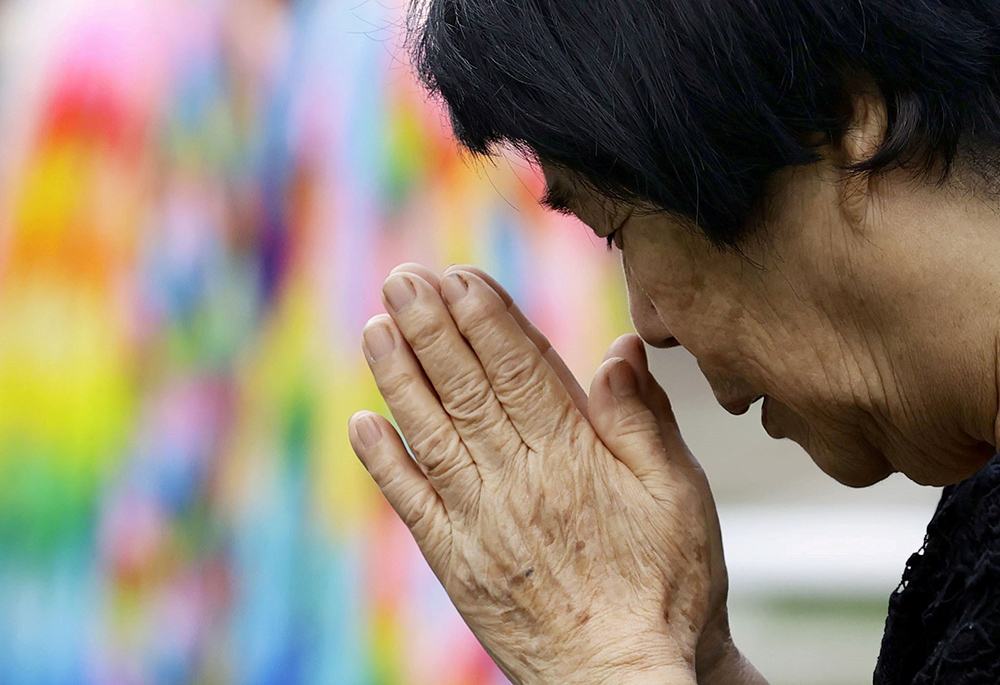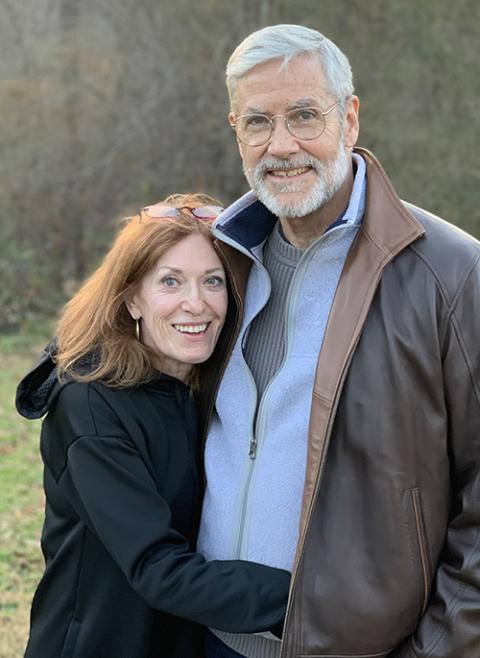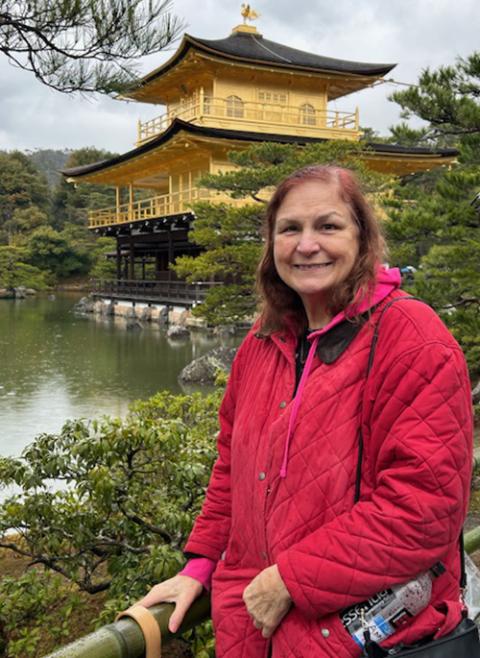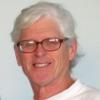
A woman prays for victims of the 1945 atomic bombing at Nagasaki's Atomic Bomb Hypocenter Park in Japan Aug. 9, 2020, the 75th anniversary of the bombing. Former priest Robert Cushing is in Japan leading a reconciliation pilgrimage for the bombings with 10 others, most of them members of Pax Christi USA. (CNS/Reuters/Kyodo)
In August 1945, U.S. President Harry Truman ordered American forces to drop two atomic bombs on the Japanese cities of Hiroshima and Nagasaki, killing and injuring tens of thousands of noncombatants in the first — and only — use of nuclear weapons on civilian populations.
No U.S. president has ever apologized to the Japanese people for the bombings, which are given credit in some circles for bringing World War II to an end.
While sorrow and regret have not been expressed by the U.S. government, a former Catholic priest and pacifist, Robert Cushing, will be apologizing in person in March for the second time to the Japanese people. In 2005, NCR reported on Cushing's first solo trip, in which he delivered a letter of apology to Japan that resulted in his being dismissed from his Augusta, Georgia, parish and transferred. That time, Cushing delivered hundreds of names on petitions of apology that were sponsored by Pax Christi Georgia.

Robert Cushing and his spouse Donna Laney Cushing are pictured. They are both taking part in the pilgrimage to Japan. (Courtesy of Robert Cushing)
Cushing, who retired from the Diocese of Savannah in 2021 after 44 years as a priest, and is now married, is back in Japan again, this time leading a pilgrimage of reconciliation with 10 others, most of them members of Pax Christi USA. From March 7-17, the pilgrims are visiting both Hiroshima and Nagasaki and meeting with many groups and church leaders.
Delayed by the COVID-19 pandemic, the pilgrimage to Japan was first suggested by Rosemarie Pace, who heads Pax Christi New York State. Last year, Pace, who is on the trip, contacted Cushing about getting the pilgrimage back on the radar. Some of the original people planning to make the trip had to drop out, but the 11 on the trip include people from Georgia, New York, Massachusetts, Virginia, California and Kansas.
Cushing said that today's nuclear arsenals feature much more deadly weapons in the hands of more countries, and many more threats from the leaders of nuclear-armed nations to use the weapons in combat.
"The use of nuclear weapons is the choice to send the world to hell," Cushing told NCR. "People need to understand that nuclear weapons are the end of the world."
Pace said recent threats from world leaders to use nuclear weapons in war just makes the effort to abolish nuclear weapons "more urgent."
Because the atomic bombs were dropped more than 78 years ago, Pace thinks the bombings are "a way distant memory" for most Americans. However, the 2023 film "Oppenheimer," which tells the story of American physicist J. Robert Oppenheimer, who is often called the "father of the atomic bomb," has helped bring the bombings "to the foreground," increasing interest in the nuclear issues.
"I just hope when we come back from this trip there'll be opportunities at schools and parishes," Pace said. "This is a real serious threat."
In Japan, Pace said she wants to "see firsthand" what happened to the Japanese people affected by the atomic bombs.
Advertisement
The pilgrims had planned to offer a letter of apology to the people of Hiroshima and Nagasaki on March 10.
In part, the letter states the pilgrimage of reconciliation is "to express our profound sorrow for the atomic bombing of your cities in 1945."
"In a spirit of repentance, we ask forgiveness for the terrible wounds which we inflicted upon your people," it continues. "We grieve the hundreds of thousands of innocents who were lost."
"We are pilgrims of peace seeking reconciliation for the crimes our people committed against Japan," says the letter. "By establishing personal right-relationships with you, through shared prayer and open dialogue, we commit to ensuring that such human suffering is never inflicted upon humanity again by working tirelessly for the total abolition of nuclear weapons."
The pilgrims are also calling on both Japan and the U.S. to sign on to the Treaty on the Prohibition of Nuclear Weapons, the first legally binding international agreement to completely prohibit nuclear weapons. Neither country is among the 163 signatory and party states.

Ann Suellentrop is pictured on the pilgrimage in Japan. (Courtesy of Ann Suellentrop)
Among those on the pilgrimage is Ann Suellentrop, 72, a pediatric nurse who has retired after having cared for children for 45 years. Suellentrop is also a peace activist in the Kansas City area who is part of a group that has been calling attention to a nuclear weapons facility there, which produces and procures an estimated 85% of the nonnuclear parts for U.S. nuclear weapons.
Officially named the Kansas City National Security Campus, Suellentrop said the plant "is of vital importance in the making of nuclear weapons."
Having been arrested for nonviolent direct action at the plant three times, Suellentrop, who also sits on the national board of Physicians for Social Responsibility, decided to join the pilgrimage and to join Pax Christi USA.
Cushing said the highlight of his 2005 visit came on Aug. 6, the 60th anniversary of the atomic bomb being dropped on Hiroshima. Cushing met the then-bishop of Hiroshima, Joseph Atsumi Misue, whom he called "a gentle man … whose warm smile was most welcoming."
"I had carefully unpacked the thousand paper cranes that my Augusta friends had folded in a prayer of solidarity," said Cushing. "When I offered them to the bishop, he accepted them with delight but was surprised that we knew of this tradition. He explained that each folded crane represented a prayer with the Holy Spirit. This tickled me, because it was what I had told my parishioners in Georgia, even though I had only intuited that it was correct, until now."
Cushing was also invited to participate in a Mass at Hiroshima's Assumption of Mary Cathedral, which is also known as the Memorial Cathedral of World Peace. The Mass was held at the exact time that the atomic bomb fell. Cushing also read aloud his letter of apology.
"The larger group response afterwards was stunning," Cushing said. "I was mobbed by a dozen or so folks, shaking my hand. tearfully, thanking me for bringing such a message. One Japanese sister said she had never heard an American say that they were sorry for dropping the bomb. It was a first for her and she was deeply touched. Her father had been killed in the blast and she had always carried anger and great hurt towards Americans."
" 'This healed something inside me,' " Cushing said the woman told him. " 'Praise God! If this were the only thing that came from your trip here, it would be worth it!' "







